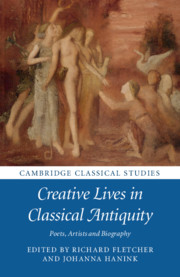Book contents
- Frontmatter
- Contents
- List of contributors
- List of illustrations
- Part I Opening remarks
- Part II Reviving dead poets
- 3 Close encounters with the ancient poets
- 4 Recognizing Virgil
- Part III Lives in unexpected places
- Part IV Laughing matters and Lives of the mind
- Part V Portraits of the artist
- Works cited
- Index
3 - Close encounters with the ancient poets
from Part II - Reviving dead poets
Published online by Cambridge University Press: 01 December 2016
- Frontmatter
- Contents
- List of contributors
- List of illustrations
- Part I Opening remarks
- Part II Reviving dead poets
- 3 Close encounters with the ancient poets
- 4 Recognizing Virgil
- Part III Lives in unexpected places
- Part IV Laughing matters and Lives of the mind
- Part V Portraits of the artist
- Works cited
- Index
Summary
In his Autobiography, Malcolm X claims that the Homeric Question is something that preoccupied him during his incarceration:
It was right there in prison that I made up my mind to devote the rest of my life to telling the white man about himself – or die. In a debate about whether or not Homer had ever existed, I threw into those white faces the theory that Homer only symbolized how white Europeans kidnapped black Africans, then blinded them so that they could never get back to their own people. (Homer and Omar and Moor, you see, are related terms; it's like saying Peter, Pedro, and petra, all three of which mean rock.) These blinded Moors the Europeans taught to sing about the Europeans’ glorious accomplishments. I made it clear that was the devilish white man's idea of kicks. Aesop's Fables – another case in point. ‘Aesop’ was only the Greek name for an Ethiopian.
What Malcolm X decided to do in prison (i.e. devote the rest of his life to ‘telling the white man about himself’) is expressed in terms of an ancient Greek life. And that ancient life turns out to be the life of a black slave. The blinding of Homer – the most traumatic event in the poet's ancient biography – becomes an image for the Middle Passage, the defining catastrophe in the collective history of the African-American people, the point of no return. Malcolm X presents Homer not only as a kidnapped ancestor, however, but as a literary precursor. The white man wants to hear about his own great deeds, and what Malcolm X sets out to do is precisely to sing about the deeds of the white man, even if in terms that do not conform to eulogy. The Autobiography of Malcolm X thus sets out to emancipate Homer's original project: rather than ‘the Europeans’ glorious accomplishments’, it promises an account of their misdeeds. The point of contestation is not, in the first instance, the content of the Iliad and Odyssey (which is immediately conceded as what Europeans like to hear), but the identity of the author, and therefore the context, process and meaning of his creation. The fact that there is a scholarly Question about Homer opens up space for this shifting of the poet's identity.
- Type
- Chapter
- Information
- Creative Lives in Classical AntiquityPoets, Artists and Biography, pp. 51 - 74Publisher: Cambridge University PressPrint publication year: 2016
- 1
- Cited by

